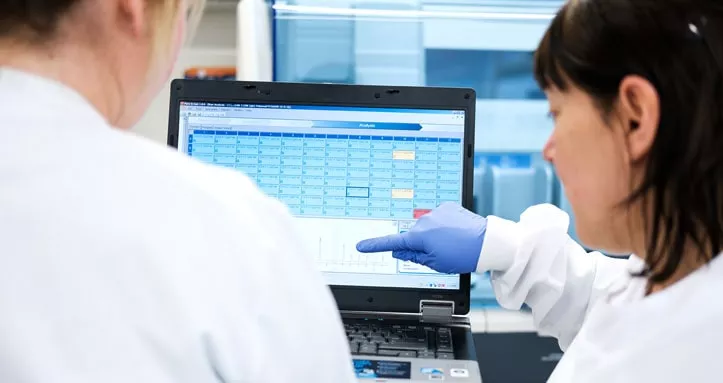
A first-of-its-kind UK registry for children and adults who are at risk of developing type 1 diabetes has been launched at the University of Oxford, with our funding.
The UK Islet Autoantibody Registry aims to transform how people in the early ‘hidden’ stages of type 1 diabetes are monitored and supported, and act as a gateway to ground-breaking clinical trials and treatments.
The registry – led by Dr Rachel Besser – will track children and adults who have tested positive for type 1 diabetes autoantibodies. These are proteins used by the immune system to target insulin-making beta cells for destruction. Autoantibodies can show up in blood tests months or years before symptoms of type 1 diabetes appear – providing a crucial early warning sign.
Research studies – like ELSA and T1DRA – are testing children and adults for autoantibodies. And doctors may also test for autoantibodies in the clinic. If someone tests positive it means they have a higher risk of developing type 1.
Once someone has two or more autoantibodies, we say they have early-stage type 1 diabetes. At this point type 1 diabetes has already begun, but people still have normal blood sugar levels and don't yet have symptoms or need treatment. Over the following months or years, the immune system will continue destroying beta cells until the pancreas can no longer produce enough insulin, and people progress to a diagnosis of type 1 diabetes.
Right now, there’s little support for this emerging group of people who are on the road towards type 1 diabetes, but haven’t yet fully developed it. Dr Besser’s registry aims to change that.
Its goals are:
- To help healthcare professionals monitor people with autoantibodies and catch the onset of ‘full’ type 1 diabetes early – so they can be started on insulin promptly and avoid dangerous diabetic ketoacidosis (DKA) at diagnosis.
- To tell people about new immunotherapy treatments, like teplizumab, and opportunities to take part in research that could delay their type 1 diabetes diagnosis.
- To understand what it’s like for people to know they're very likely to develop type 1 diabetes, and create ways better to support them.
- To work out new processes in the NHS to care for people with type 1 diabetes autoantibodies.
- To collect data that will help scientists better understand how type 1 diabetes progresses through its early, symptomless stages.
Anyone in the UK who has tested positive for autoantibodies can sign up to join the UK Islet Autoantibody registry.
Dr Rachel Besser at University of Oxford said:
“This registry is a first for the UK and brings together children and adults who are at risk of type 1 diabetes. It is an important step towards a better understanding of the care and support people at high risk of this condition require, allowing us to offer them a ‘softer landing’ into life with the condition, as well as opportunities to take part in studies testing drugs to delay type 1 diabetes occurring.”
Tracy Savory has a daughter who was identified through research as having type 1 diabetes autoantibodies. She also has a son already living with type 1 diabetes. She said:
“I have a dual perspective on this. Having a child who was seriously ill at diagnosis of type 1 diabetes, I really understand the importance of catching it early. But I’m also aware that if you have a child who is autoantibody positive who isn’t involved in research, there is a lack of follow-up care.
“The registry is developing pathways to support people and sharing this information with primary care. There is also the opportunity to find out about any trials that could possibly help, rather than having to trawl the internet ourselves.
“For my daughter, who doesn't know anybody else in the same position as her, it will be a comfort to find out about other people in a similar situation and hear their stories, just to understand more about what it means to be autoantibody positive. With the registry, it feels like she will be more supported in a range of ways.”
You can read more of Tracy's story.
Dr Lucy Chambers, Head of Research Impact and Communications at Diabetes UK, said:
“There’s a crucial window - months or even years before a type 1 diabetes takes hold - to tackle the immune system dysfunction at the root of the condition. The UK Islet Autoantibody Registry will be critical in seizing this opportunity, helping thousands of families and individuals to get on the front foot of their type 1 diabetes journey.
"It will enable access to the care they need to prepare for a life with the condition, as well as clinical trials of new treatments that can hold off the immune attack and delay the need for insulin.”
